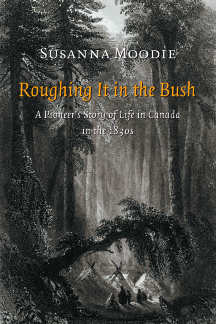Susanna Moodie
Roughing It in the Bush
A Pioneer’s Story
of Life in Canada
in the 1830s

THIS CANADIAN PIONEERING CLASSIC
is a first-rate account of life in the woods at the beginning of the short period that would see the transformation of Canada from a land of inaccessible woods and log huts to one of stately farms, fine towns, roads, and railways. From the imbroglio of disparate elements a great nation would soon arise.
From this book:
Back Cover Description
In 1832, Susanna Strickland marries John Moodie, a junior officer. They
emigrate to Canada. Middle class, and too proud to engage in physical labour,
the Moodies rely on servants to clear the land and work the farm. Debts
mount, and they suffer a steady decline into “the soul-ennobling
school of
poverty.” They are forced to come to terms with their class
prejudices.
Susanna’s first attempts to make bread and maple sugar fail; she does not
know how to milk the cows; she is terrified of the wolves when left alone
with her infant in their log cabin; the wheat crop turns out so poor that it
can only be exchanged for whisky, at the distillery. The
“semi-barbarous Yankee squatters” rob and torment her.
Susanna has a keen eye for the comic and the ridiculous, and a dickensian
feeling for the heroism, self-sacrifice, and courage of the poor, whose
antics—and crimes—she records, allowing them to speak in their own American,
Scots, or Irish brogue.
There are sublime moments in the wilderness, as the
Moodies explore the lakes and rivers with their toddlers, fishing, gathering
raspberries, and visiting the natives: “We beheld the landscape,
savage and grand in its primeval beauty.”
The Rebellion of 1837 hits the bush dwellers like a
thunderbolt: “Buried in the obscurity of those woods, we knew nothing,
heard nothing of the political
state of the country, and were little aware of the revolution which was about
to work a great change for us and for Canada.”
John is called away to fight
the rebels. To Susanna, it seems like the ultimate hardship.